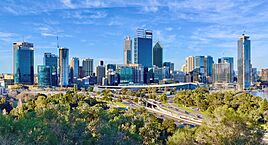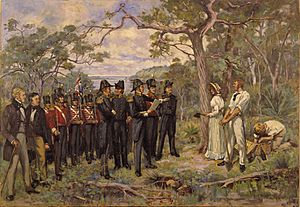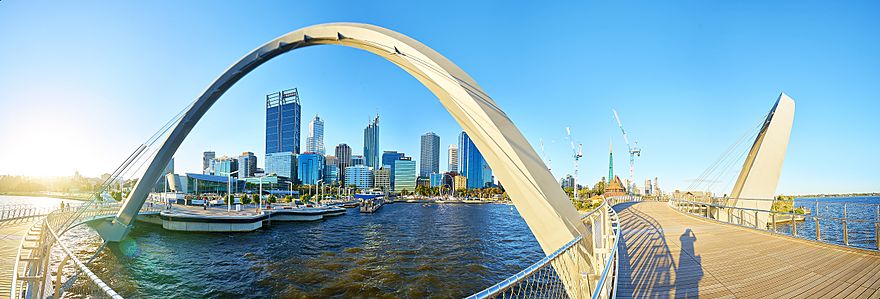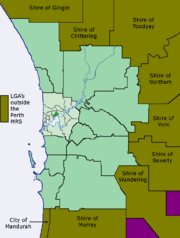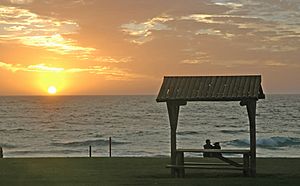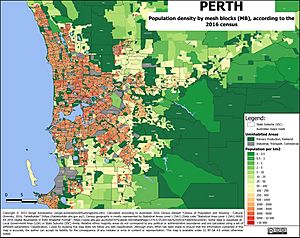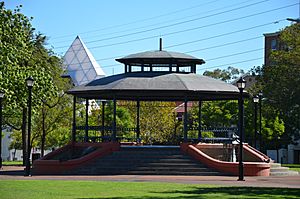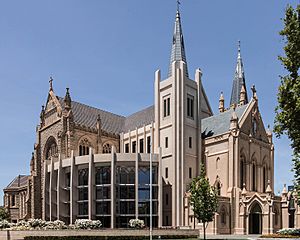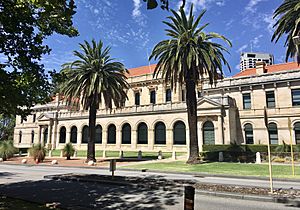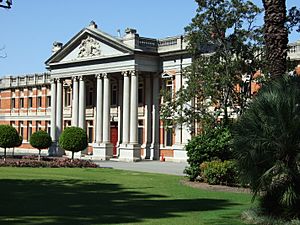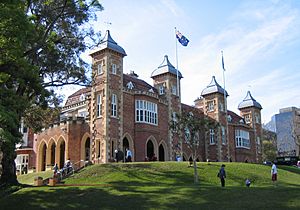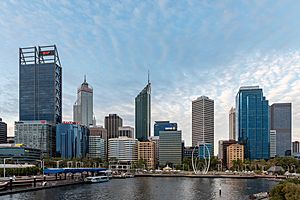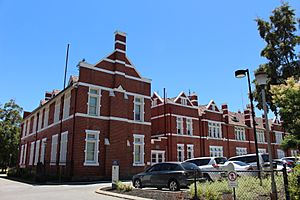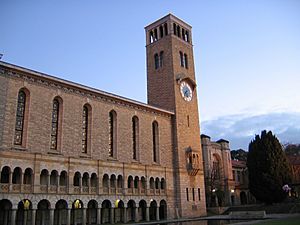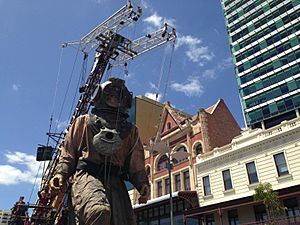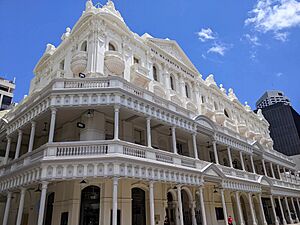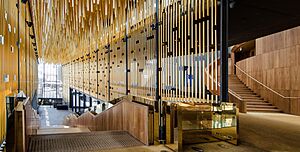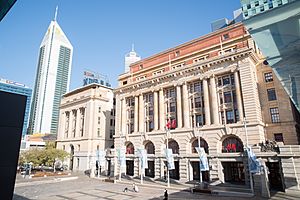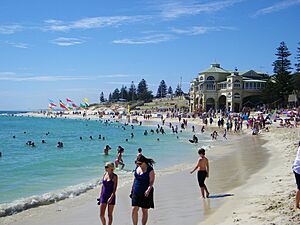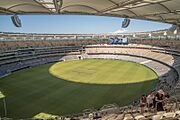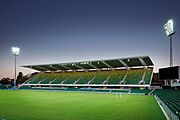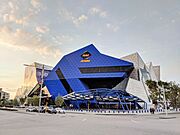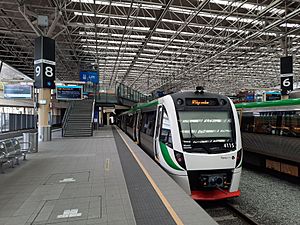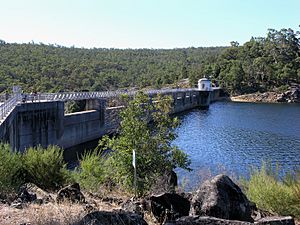Perth facts for kids
Quick facts for kids PerthWestern Australia |
|||||||||
|---|---|---|---|---|---|---|---|---|---|
|
|
|||||||||
| Lua error in Module:Location_map at line 416: Malformed coordinates value. | |||||||||
| Population | 2,309,338 (2023) (4th) | ||||||||
| • Density | 359.8277/km2 (931.949/sq mi) | ||||||||
| Established | 4 June 1829 | ||||||||
| Area | 6,417.9 km2 (2,478.0 sq mi)(GCCSA) | ||||||||
| Time zone | AWST (UTC+08:00) | ||||||||
| Location | |||||||||
| State electorate(s) | Perth (and 41 others) | ||||||||
| Federal Division(s) | Perth (and 11 others) | ||||||||
|
|||||||||
Perth (Nyungar: Boorloo) is the capital city of Western Australia. It is the fourth largest city in Australia. Over 2.3 million people live in Greater Perth as of 2023. The city is located on the Swan Coastal Plain. This area is between the Indian Ocean and the Darling Scarp. Perth grew from early British settlements along the Swan River. Its main city area and the port of Fremantle are on this river.
Perth was started by Captain James Stirling in 1829. It was the main place for the Swan River Colony. The city sits on the traditional lands of the Whadjuk Noongar people. Aboriginal Australians have lived here for at least 45,000 years. Perth was named after the city of Perth in Scotland. Queen Victoria declared Perth a city in 1856.
Perth is known as one of the world's most liveable cities. It is divided into 30 local government areas. These areas include over 350 suburbs. The city stretches about 125 kilometres (78 miles) from north to south. It goes about 45 kilometres (28 miles) from the west coast to the east. Important areas outside the main city include Fremantle and Joondalup.
Perth has many important public buildings and cultural sites. These include the Parliament House and Government House. The city's main port is Fremantle Harbour. Perth Airport serves the city. Perth was a naval base for the Allies during World War II. Today, the Royal Australian Navy's Fleet Base West is nearby. All five of Western Australia's universities are in Perth.
Contents
Perth's Name and History
How Perth Got Its Name
Perth was named after Perth, Scotland. This was to honour Sir George Murray. He was a British government official. The name was part of the colony's founding statement in 1829.
Since 2019, Boorloo has been recognized as a Noongar name for the city. Some believe Boorloo means "big swamp." This describes the area where the city centre is now. The Noongar people are the traditional owners of this land.
Early History of Perth
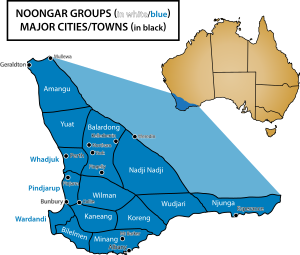
People have lived in the Perth area for at least 45,000 years. The wetlands were very important to the Noongar people. They provided food and had spiritual meaning. The Mooro clan of the Noongar people lived around the Swan River.
In 1697, Dutch Captain Willem de Vlamingh was the first European to explore the area. He named the river Swarte Swaene-Revier (Black Swan River). This was because of the many black swans he saw.
Founding the Swan River Colony
Perth was the first large European settlement in Western Australia. It was started in 1829. The colony was later called "Western Australia." But for many years, it was known as the "Swan River Colony."
On June 4, 1829, British colonists first saw the mainland. Western Australia celebrates this day each year. On August 12, 1829, the town was officially founded.
As the colony grew, there were conflicts between settlers and the Noongar people. This led to sad events like the death of Yagan. The Noongar people were forced to change their way of life.
Growth and Gold Rushes
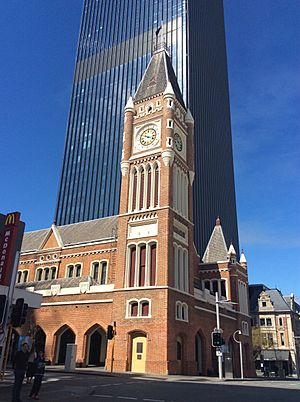
In 1850, Western Australia started bringing in convicts. This was because there was a shortage of workers. Over the next 18 years, nearly 10,000 convicts arrived.
Perth officially became a city in 1856. In the late 1800s, gold was discovered at Kalgoorlie. This led to a mining boom. Perth's population grew from 8,500 in 1881 to 61,000 in 1901.
Modern Perth and the "City of Light"
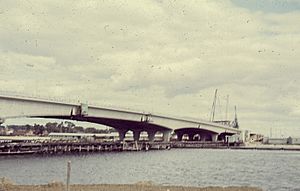
Western Australia joined the Federation of Australia in 1901. This happened after other states agreed to build a railway line to connect Perth.
After World War II, Perth's population grew quickly. New industries and people from other countries helped the city expand. In 1962, Perth became known as the "City of Light." This happened when residents turned on their lights as American astronaut John Glenn flew overhead in space. The city did it again in 1998 when he passed by on the Space Shuttle.
Perth's growth has been helped by its role as a service centre for the state's mining industry. This includes gold, iron ore, and natural gas.
Perth's Geography
City Centre and Metropolitan Area
Perth's main city area is next to the Swan River. Kings Park is to the west. A project called Perth City Link moved a railway line underground. This made it easier to walk between Northbridge and the city centre. The Perth Arena is a cool building for shows and sports.
St Georges Terrace is a main street with many offices. Hay Street and Murray Street have most of the shops and fun places. The tallest building in Perth is Central Park.
Perth's metropolitan area is very large. It stretches about 125 kilometres (78 miles) along the coast. It also goes about 50 kilometres (31 miles) from the coast inland. The built-up area of Perth is about 1,722 square kilometres (665 sq mi). This makes Perth one of the least crowded large cities in the world.
The metropolitan area includes 30 local government areas. These areas stretch from Two Rocks in the north to Singleton in the south. It also includes Rottnest Island and Garden Island.
Land and Rivers
Perth is on the Swan River. The city centre and most suburbs are on the Swan Coastal Plain. This area is mostly flat and sandy. To the east, there is a low hill range called the Darling Scarp.
Perth has two main river systems. The Swan and Canning Rivers flow into the ocean near Fremantle. The Serpentine and Murray Rivers flow into the Peel Inlet near Mandurah.
Perth's Climate
Perth has a Mediterranean climate. This means it has hot, sunny, and dry summers. Winters are mild and wet. February is usually the hottest month. Perth gets about 8.8 hours of sunshine each day. This makes it Australia's sunniest capital city.
In summer, temperatures can go above 35°C (95°F) about 26 days a year. A cool sea breeze called the "Fremantle Doctor" often blows in the afternoons. This helps to cool things down.
Winters are mild and wet. Most rain falls between May and September. The lowest temperature recorded in Perth was -0.7°C (30.7°F) in 2006. Snow is very rare in Perth. It has never been recorded in the city centre.
The amount of winter rain has decreased since the 1970s. But there are more heavy rain events in summer. For example, a big storm in 2010 brought lots of rain and hail.
| Climate data for Perth Metro | |||||||||||||
|---|---|---|---|---|---|---|---|---|---|---|---|---|---|
| Month | Jan | Feb | Mar | Apr | May | Jun | Jul | Aug | Sep | Oct | Nov | Dec | Year |
| Record high °C (°F) | 44.4 (111.9) |
46.2 (115.2) |
42.4 (108.3) |
39.5 (103.1) |
34.3 (93.7) |
26.2 (79.2) |
25.8 (78.4) |
30.0 (86.0) |
34.3 (93.7) |
37.2 (99.0) |
40.4 (104.7) |
44.2 (111.6) |
46.2 (115.2) |
| Mean daily maximum °C (°F) | 31.4 (88.5) |
31.6 (88.9) |
29.6 (85.3) |
25.9 (78.6) |
22.3 (72.1) |
19.4 (66.9) |
18.5 (65.3) |
19.1 (66.4) |
20.5 (68.9) |
23.3 (73.9) |
26.6 (79.9) |
29.5 (85.1) |
24.8 (76.6) |
| Mean daily minimum °C (°F) | 18.1 (64.6) |
18.4 (65.1) |
16.9 (62.4) |
13.8 (56.8) |
10.5 (50.9) |
8.6 (47.5) |
8.0 (46.4) |
8.4 (47.1) |
9.6 (49.3) |
11.6 (52.9) |
14.3 (57.7) |
16.5 (61.7) |
12.9 (55.2) |
| Record low °C (°F) | 8.9 (48.0) |
9.9 (49.8) |
6.3 (43.3) |
4.7 (40.5) |
1.3 (34.3) |
−0.7 (30.7) |
0.0 (32.0) |
1.3 (34.3) |
1.0 (33.8) |
2.2 (36.0) |
5.0 (41.0) |
6.6 (43.9) |
−0.7 (30.7) |
| Average rainfall mm (inches) | 17.2 (0.68) |
13.4 (0.53) |
20.6 (0.81) |
37.0 (1.46) |
86.5 (3.41) |
127.3 (5.01) |
147.1 (5.79) |
123.8 (4.87) |
81.8 (3.22) |
40.4 (1.59) |
25.3 (1.00) |
9.9 (0.39) |
731.1 (28.78) |
| Average precipitation days (≥ 1 mm) | 1.6 | 1.2 | 2.6 | 4.8 | 8.6 | 11.8 | 14.7 | 13.1 | 10.9 | 5.9 | 3.8 | 1.9 | 80.9 |
| Average afternoon relative humidity (%) (at 15:00) | 39 | 38 | 40 | 46 | 50 | 56 | 57 | 54 | 53 | 47 | 44 | 41 | 47 |
| Mean monthly sunshine hours | 356.5 | 319.0 | 297.6 | 249.0 | 207.0 | 177.0 | 189.1 | 223.2 | 231.0 | 297.6 | 318.0 | 356.5 | 3,221.5 |
| Percent possible sunshine | 83 | 83 | 74 | 70 | 63 | 57 | 57 | 63 | 64 | 72 | 77 | 79 | 70 |
| Average ultraviolet index | 12 | 11 | 9 | 6 | 4 | 3 | 3 | 4 | 6 | 8 | 10 | 12 | 7 |
| Source: Bureau of Meteorology Temperatures: 1993–2023; Rainfall: 1993–2023; Relative humidity: 1994–2011 |
|||||||||||||
Perth's Isolation
Perth is one of the most isolated major cities in the world. It has over two million people. The closest city with over 100,000 people is Adelaide, which is over 2,100 kilometres (1,300 miles) away. Perth is actually closer to East Timor and Jakarta, Indonesia, than to Sydney.
People of Perth
Perth is Australia's fourth-largest city. It passed Adelaide in size in 1984. In June 2023, about 2.3 million people lived in Greater Perth. This was a 3.6% increase from 2022. It is the fastest growing capital city in Australia.
Ancestry and Immigration
| Birthplace | Population |
|---|---|
| Australia | 1,258,506 |
| England | 169,938 |
| New Zealand | 59,459 |
| India | 58,229 |
| South Africa | 38,793 |
| Malaysia | 31,268 |
| Philippines | 30,806 |
| Mainland China | 27,237 |
| Scotland | 23,280 |
| Vietnam | 17,174 |
| Italy | 16,536 |
| Ireland | 16,412 |
| Singapore | 15,387 |
| Indonesia | 13,031 |
| Zimbabwe | 10,743 |
Many people in Perth have British and Irish backgrounds. In 2021, over 169,000 people born in England lived in Perth. This is more than in Sydney, even though Sydney is much bigger.
After World War II, many immigrants came from Europe. These included Italians, Greeks, and Dutch. Fremantle was often the first place they landed in Australia. The Italian culture is very strong in Fremantle.
More recently, many people from South Africa have moved to Perth. They often choose Perth because of its location and climate. People from Asia have also moved to Perth. These include communities from Vietnam, Malaysia, and China. In 2016, about 5.3% of Perth's population was of Chinese descent.
Perth also has people from the Middle East and Latin America. There is a large Parsee community from Bombay, India. Perth is also home to many Anglo-Burmese and Anglo-Indian people.
In 2021, 2% of Perth's population identified as Aboriginal and/or Torres Strait Islander.
Languages Spoken
In 2021, 74% of people in Perth spoke only English at home. Other common languages were Mandarin (2.3%), Italian (1.1%), and Vietnamese (1.0%).
Religions in Perth
In 2021, 41.8% of people in Perth said they had no religion. This is higher than the national average.
Catholics are the largest Christian group, making up 19.5% of the population. Anglicans are 9.9%. Buddhism and Islam each have over 50,000 followers. Hinduism is growing fast in Perth. There are Hindu temples in Canning Vale and Anketell.
How Perth is Governed
Perth is governed by three levels: local, state, and federal.
Local Government
The Perth area is divided into 30 local government areas. The City of Perth manages the main city centre. These areas include places like Wanneroo in the north and Rockingham in the south.
State Government
Perth is home to the Parliament of Western Australia. This is where state laws are made. The Governor of Western Australia also lives in Perth. Most of the state's politicians are based in the Perth area.
The state's highest court, the Supreme Court, is in Perth.
Federal Government
Perth has 10 seats in the Federal House of Representatives. This is part of Australia's national government. The Federal Court of Australia also has a building in Perth.
Perth's Economy
Perth is very important to the Western Australian economy. It is the main centre for business and government. Even though mining and farming happen elsewhere, Perth provides many services for these industries.
Perth's economy has changed over time. Since the 1950s, more jobs are in service industries. Most people in Perth work in jobs that provide services to other people in the city.
Because Perth is so far away from other big cities, it hasn't developed many large factories. It's often cheaper to bring in manufactured goods from other parts of Australia or overseas.
After World War II, Perth grew a lot. New industrial areas like Kwinana were built. These areas have heavy industries like oil refineries.
Perth has also become a place for new technology companies. Companies like Appbot and Agworld started here. There are programs to help new businesses grow in Perth.
Education in Perth
Education is required in Western Australia for kids aged six to seventeen. This covers primary and secondary school. After that, students can go to universities or TAFE colleges.
Schools in Perth
Students can go to public schools, run by the state government. Or they can go to private schools, which are often linked to a religion. Some students also learn at home.
Students who finish Years 11 and 12 get the Western Australian Certificate of Education (WACE).
Universities and Colleges
Perth has four public universities:
- The University of Western Australia (UWA)
- Curtin University
- Murdoch University
- Edith Cowan University
There are also two private universities:
- The University of Notre Dame Australia
- A campus of the University of Divinity
UWA was founded in 1911. It is known for its research. Its buildings are beautiful and made of white limestone. UWA is part of the Group of Eight, which are top Australian universities. A UWA graduate, Barry Marshall, won a Nobel Prize in 2005.
Curtin University is the largest university in Western Australia by student numbers.
Murdoch University has the state's only veterinary school.
Edith Cowan University was started in 1991. It includes the Western Australian Academy of Performing Arts.
The University of Notre Dame Australia is a Catholic university. Its main campus is in Fremantle.
TAFE colleges offer training for trades and jobs. There are two main TAFE colleges in Perth: North Metropolitan TAFE and South Metropolitan TAFE.
Media in Perth
Newspapers
The main newspapers in Perth are The West Australian and The Sunday Times. There are also free local papers for different areas.
Radio Stations
Perth has many radio stations. These include ABC stations like 720 ABC Perth. Commercial stations include Triple M Perth and Nova 93.7. There are also community radio stations like RTRFM.
Television Channels
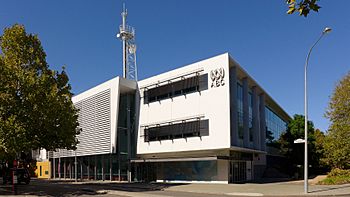
Perth has many free-to-air digital TV channels. These include:
- ABC TV
- SBS
- Seven
- Nine
- 10
Foxtel offers paid satellite and cable TV. Perth has its own local news presenters for ABC, Seven, Nine, and Ten.
Since 1968, an annual telethon has been broadcast in Perth. It raises money for charities. It is said to be the most successful fundraising event per person in the world.
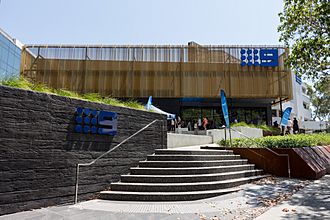
Online News
Online news for Perth includes TheWest.com.au, Perth Now, and WAToday.
Culture and Fun in Perth
Arts and Entertainment
Perth hosts many cultural events. The Perth Festival is Australia's oldest annual cultural festival. It has been held every year since 1953. The Fringe World Festival is another popular event in January and February. Perth also has music festivals like Listen Out. The Perth International Comedy Festival brings local and international comedians.
The Perth Cultural Centre is home to many important arts places. These include the Art Gallery of Western Australia and the Western Australian Museum. The State Theatre Centre of Western Australia is also there. It is home to the Black Swan State Theatre Company.
Other arts groups include the West Australian Ballet and the West Australian Symphony Orchestra. The Western Australian Academy of Performing Arts (WAAPA) is in Perth. Many famous actors and broadcasters have studied there, like Hugh Jackman.
Perth's main performance places include the Perth Concert Hall and His Majesty's Theatre. Perth Arena also hosts concerts and sports. Outdoor concerts happen at Kings Park.
Many famous musicians are from Perth. These include AC/DC frontman Bon Scott. His grave is a popular place to visit. Other bands from Perth include Tame Impala.
Perth has been featured in books and songs. The novel Cloudstreet by Tim Winton is set in Perth. Songs like "I Love Perth" by Pavement mention the city.
Tourism and Recreation
Tourism is important for Perth's economy. Many visitors come to see the city. Attractions are mostly around the city centre, Fremantle, the coast, and the Swan River.
There are many museums in Perth. The Scitech Discovery Centre is an interactive science museum. The Western Australian Maritime Museum in Fremantle shows maritime history. It has the Australia II yacht, which won the 1983 America's Cup. The Army Museum of Western Australia is also in Fremantle. The Aviation Heritage Museum has a collection of aircraft.
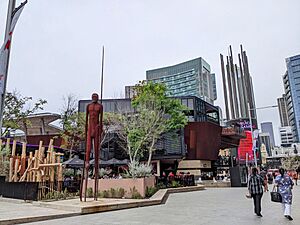
Perth has many historic sites. Some of the oldest buildings are the Round House in Fremantle and the Old Mill in South Perth. Yagan Square connects Northbridge and the city centre. It has a tall digital tower and a large statue called "Wirin." Elizabeth Quay is another popular spot. It has the Swan Bells and a cool sculpture called Spanda.
Shopping in Perth's city centre is mainly on Murray Street and Hay Street. These streets are pedestrian malls. Fremantle Markets are historic markets from 1897.
Restaurants, bars, and nightclubs are found in places like Northbridge and Fremantle. The Crown casino and resort is in Burswood.
The Swan Valley is a fertile area near Perth. It has many wineries and food producers. You can find microbreweries and rum distilleries there too.
Kings Park is a huge park in central Perth. It is one of the world's largest inner-city parks. It has the State War Memorial and the Western Australian Botanic Garden. Other features include the DNA Tower and Jacob's Ladder.
Hyde Park is another park north of the city centre. National parks like John Forrest are on the edges of the city. Whiteman Park is a large bushland area with walking trails and a wildlife park.
Perth Zoo in South Perth has animals from Australia and around the world. It helps breed endangered animals.
The Aquarium of Western Australia (AQWA) in Hillarys is Australia's largest aquarium. It focuses on marine animals from Western Australia's coast. The northern Perth coastline is called Sunset Coast. It has many beaches and the Marmion Marine Park.
Sports in Perth
Perth's climate is great for outdoor sports. Perth hosted the 1962 British Empire and Commonwealth Games and the 1987 America's Cup. Australian rules football is the most popular sport. The two teams in the Australian Football League are the West Coast Eagles and the Fremantle Football Club. They have huge fan bases.
-
Optus Stadium hosts cricket and Australian rules football.
-
HBF Park hosts rugby league, rugby union and soccer.
-
The exterior of Perth Arena.
Other popular sports include cricket, basketball, soccer, and rugby.
| Club | League | Sport | Venue | Established |
|---|---|---|---|---|
| Fremantle Dockers | AFL/AFL Women's | Australian rules football | Optus Stadium | 1994 |
| West Coast Eagles | AFL/AFL Women's/WAFL | Australian rules football | Optus Stadium | 1986 |
| Perth Wildcats | National Basketball League | Basketball | RAC Arena | 1982 |
| Perth Lynx | Women's NBL | Basketball | Bendat Basketball Centre | 1988 |
| Perth Glory | A-League Men | Soccer | HBF Park | 1995 |
| Perth Glory Women | A-League Women | Soccer | Macedonia Park HBF Park |
2008 |
| Western Force | Super Rugby | Rugby union | HBF Park | 2005 |
| Western Force Super W | Super W | Rugby union | Harvey Field Kingsway Reserve |
2018 |
| Perth Heat | Australian Baseball League | Baseball | Harley-Davidson Ballpark | 1989 |
| West Coast Fever | Suncorp Super Netball | Netball | RAC Arena | 1997 |
| West Coast Pirates | S.G. Ball Cup | Rugby league | HBF Park | 2012 |
| Western Australia Men | Sheffield Shield | Cricket | WACA Ground | 1893 |
| Perth Scorchers | Big Bash/Women's Big Bash | Cricket | Optus Stadium | 2011 |
| Western Australia Women | Women's National Cricket League | Cricket | WACA Ground | 1934 |
| Perth Inferno | Australian Women's Ice Hockey League | Ice hockey | Cockburn Ice Arena | 2016 |
| Perth Thunder | Australian Ice Hockey League | Ice hockey | Perth Ice Arena | 2010 |
| Perth Thundersticks | Hockey One | Field hockey | Perth Hockey Stadium | 2019 |
| Perth Steel | AVSL | Volleyball | Multiple | 2012 |
Perth hosts many international sports events. These include the ATP Cup tennis tournament. The Rally Australia was held here from 1989 to 2006. Perth also has motorsport facilities like Perth Motorplex.
City Infrastructure
Transport in Perth
Perth has two airports. Perth Airport handles regional, domestic, and international flights. Jandakot Airport is for smaller planes.
Perth has a road network with three freeways. The Northbridge Tunnel is the only major road tunnel.
Public transport in Perth is called Transperth. It includes trains, buses, and ferries. You can ride buses and trains for free in the city centre.
The Indian Pacific train connects Perth to Adelaide and Sydney. Other trains connect Perth to towns within Western Australia.
Perth's main port is at Fremantle. The Fremantle Outer Harbour is a major port for large cargo.
Utilities and Water
Perth's electricity comes from government-owned companies. Verve Energy generates power. Western Power maintains the network. Synergy sells electricity to homes and businesses.
The Water Corporation provides water and wastewater services. Perth gets its water from underground and from dams. Because of less rainfall, Perth has built desalination plants. These plants turn seawater into drinking water. There are also rules about watering gardens to save water.
See also
 In Spanish: Perth para niños
In Spanish: Perth para niños
 | Delilah Pierce |
 | Gordon Parks |
 | Augusta Savage |
 | Charles Ethan Porter |


